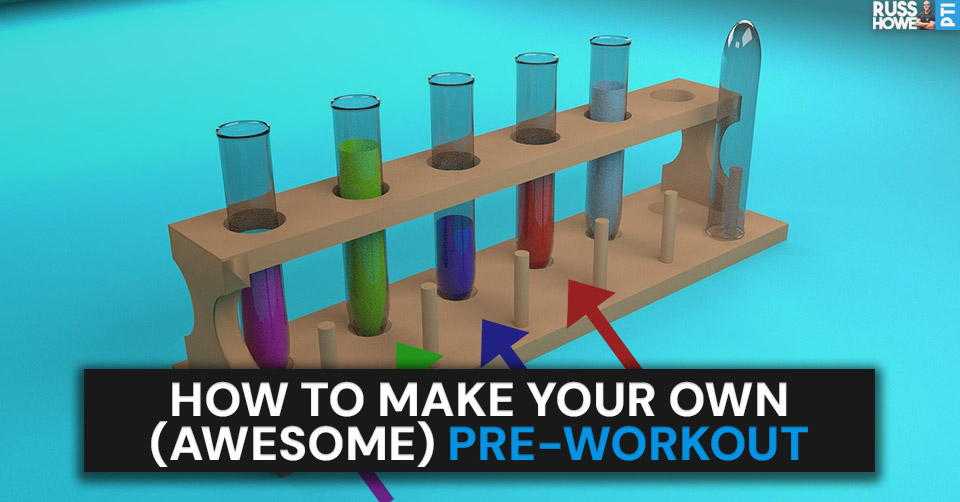Okay, so you’ve forgotten to pack your pre-workout drink in your gym bag.
We’ve all done it.
And the next best thing to do is rush to the nearest off-license and grab a can of luminous energy drink, right?
This “ultra-convenience” is one of the key factors behind why the energy drink sector has surged over the last couple of decades, with 30% of Americans already consuming at least one can every single day. I knew things were starting to get serious when The Rock got involved a few years back, but market experts believe it’ll grow upto 10x bigger in the next 10 years after Coca-Cola recently decided to enter the market. (1)
However, as much as I enjoy an ice cold can of C4 Energy, I must make this very clear:
Energy drinks are fucking awful pre-workout supplements.

Error 1: Taurine And Caffeine Clash
Have you ever felt irritated and sluggish after consuming an energy drink?
That’s down to this combination of ingredients.
Because while taurine and caffeine are both great ingredients in their own right, research shows us that they should clash when consumed simultaneously. Taurine is actually an antagonist of caffeine, and this clash is what causes you to feel fatigued instead of energised. (20, 21, 22)
Energy drinks manufacturers know this, of course.
And while taurine offers some useful training benefits, such as a boost to mental focus and slight improvements to blood flow (which may assist recovery), but the main reason it’s included is because it essentially dilutes the caffeine in the product, which causes the trainee feel like they need another one just a couple of hours later, and this puts them on a much faster track towards addiction/dependency. (17, 18, 19)
Fuck that with a capital fist!
“When taurine and caffeine are consumed simultaneously, taurine appears to reverse caffeine’s effects on vigour.” (20)

Error 2: Energy Drinks Don’t Contain Enough Caffeine To Unlock Performance-Related Benefits
They’re often touted for their caffeine content, but the vast majority of energy drinks do not actually contain enough of the stuff to unlock its potential training benefits.
Not a lot of people know this, but a 2012 meta-analysis published in the Strength and Conditioning Journal confirmed that we need at least 2.1mg caffeine per kg body weight to unlock any of the training benefits associated with it. (2)
These benefits include an increased calorie burn, greater endurance, higher mental focus, and maximal strength output. (1, 2, 3, 4, 5, 6, 7, 8)
That means a person weighing 80kg (176lbs) would need at least 168mg caffeine and (see below) most energy drinks fall short of this mark – and it’s important to remember this marker represents the threshold to unlocking the bare minimum results!

Error 3: There’s Barely Any Other Ingredients Which Help Improve Performance
There’s not a lot going on in an energy drink except caffeine.
However, a good pre workout also boasts several other ingredients which can elevate your training to a higher level. These include creatine, citrulline, beta-alanine, betaine, l-tyrosine, and l-theanine to name just a few. (9, 10, 11, 12, 13, 14, 15, 16)
Sure, certain energy drinks do include a couple of these, but one of the downsides of being suspended in a can is that these ingredients come in such a small dose that the training benefits are never realized.
And these are definitely benefits we want to unlock:
- More reps to failure
- Greater explosive strength
- Faster recovery between sets
- Superior delivery of nutrients to muscles
- Minimize/erase the common caffeine crash
Error 4: Energy Drinks Cost More Money In The Long Run
This one seems wrong at first, but it’s true.
We live in a world where convenience is king, so lots of folks are actually paying considerably more grabbing cans of energy drink on the go than they would for a decent pre-workout – they just don’t realize it!
For example, a can of the popular Monster White costs roughly £1.85, but a good pre-workout like Warrrior Rage is only £1 per serving.
So not only are people paying over the odds, they’re doing so for a product which contains ingredients which clash, and provides them with insufficient caffeine, and offers zero other performance boosting compounds.


Further Reading:
If you enjoyed this blog, then you’ll probably also like reading these.
>> Russ’ Guide To Supplements
>> Pre-Workout Checklist
>> 6 Reasons You Always Feel Zonked
References:
- Hoffman J. R., et al. Caffeine and Energy Drinks. Str Cond J (2010).
- McCormack W. P., et al. Caffeine, Energy Drinks, and Strength-Power Performance. Str Con J (2012).
- Duncan M. J., et al. The effect of caffeine ingestion on mood state and bench press performance to failure. J Strength Cond Res (2011).
- Childs E., et al. Subjective, behavioral, and physiological effects of acute caffeine in light, nondependent caffeine users. Psychopharmacology (2006).
- Kim T. W., et al. Caffeine increases sweating sensitivity via changes in sudomotor activity during physical loading. J Med Food (2011).
- Cook C., et al. Acute caffeine ingestion increases voluntarily chosen resistance training load following limited sleep. Int J Sport Nutr Exerc Metab (2012).
- Del Coso J., et al. Dose response effects of a caffeine-containing energy drink on muscle performance: a repeated measures design. J Int Soc Sports Nutr (2012).
- Mora-Rodríguez R., et al. Caffeine ingestion reverses the circadian rhythm effects on neuromuscular performance in highly resistance-trained men. PLoS One (2012).
- Lee E. C., et al. Ergogenic effects of betaine supplementation on strength and power performance. J Int Soc Sports Nutr (2010).
- Holewa J., et al. Effects of betaine on body composition, performance, and homocysteine thiolactone. Department of Kinesiology, Recreation, and Sport Studies, Coastal Carolina University (2013).
- Pérez-Guisado J., et al. Citrulline malate enhances athletic anaerobic performance and relieves muscle soreness. J Strength Cond Res (2010).
- Haskell C. F., et al. The effects of L-theanine, caffeine and their combination on cognition and mood. Biol Psychol (2008).
- Hoffman J., et al. Beta-alanine and the hormonal response to exercise. Int J Sports Med (2008).
- Artioli G. G., et al. Role of beta-alanine supplementation on muscle carnosine and exercise performance. Med Sci Sports Exerc (2010).
- Rawson E. S., et al. Effects of creatine supplementation and resistance training on muscle strength and weightlifting performance. J Strength Cond Res (2003).
- Pearson D. R., et al. Long-Term Effects of Creatine Monohydrate on Strength and Power. J Str Cond Res (1999).
- Kim S., et al. Taurine Induces Anti-Anxiety by Activating Strychnine-Sensitive Glycine Receptor in Vivo. Annals of Nutrition and Metabolism (2009).
- Moloney M. A., et al. Two weeks taurine supplementation reverses endothelial dysfunction in young male type 1 diabetics. Diab Vasc Dis Res (2010).
- Goodman C.A., et al. Taurine supplementation increases skeletal muscle force production and protects muscle function during and after high-frequency in vitro stimulation. J Appl Physiol (1985).
- Giles G. E., et al. Differential cognitive effects of energy drink ingredients: caffeine, taurine, and glucose. Pharmacol Biochem Behav. (2012)
- Peacock A., et al. Energy drink ingredients. Contribution of caffeine and taurine to performance outcomes. Appetite (2013).
- Sorkin B. C., et al. Executive summary of NIH workshop on the Use and Biology of Energy Drinks: Current Knowledge and Critical Gaps. Nutr Rev (2014).





Leave a Reply